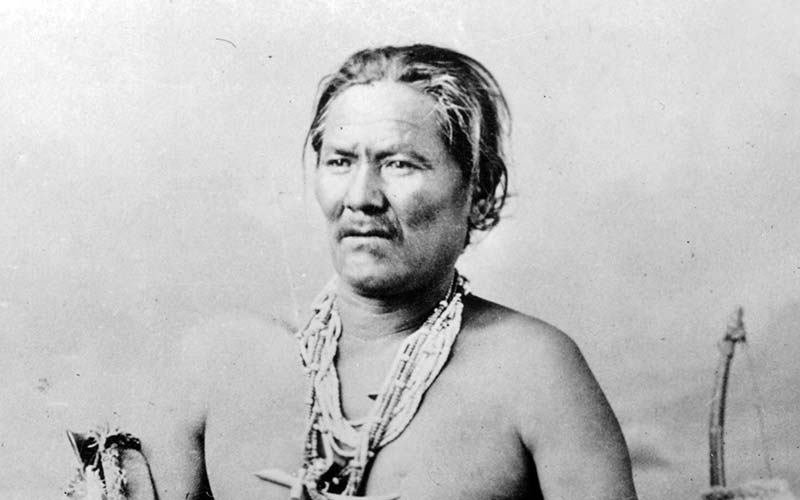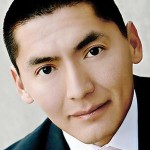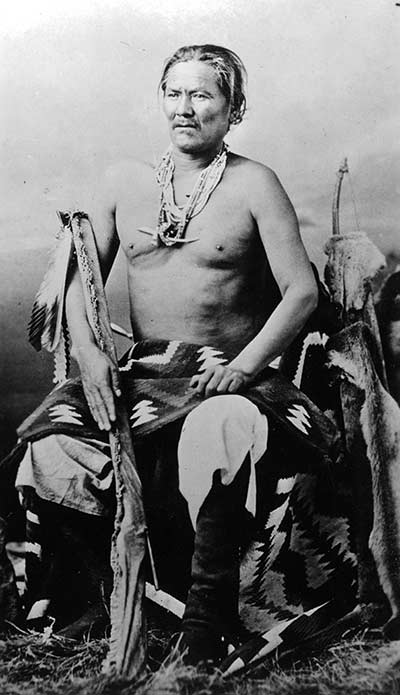
Guest Essay: Chief Manuelito’s words are still true today

Chief Manuelito.
By Carlyle Begay
Special to the Times

Carlyle Begay.
One of the most important stories from our past must remain a focus of our future. It’s a story my grandfather told me when I was growing up on the Navajo Nation and it’s been retold for generations.
During the mid-1800s, when the Navajo people were taken from our land and then finally returned back to the designated reservation after years of imprisonment, Chief Manuelito remained a steady leader and visionary for our people.
After returning from a peace keeping journey to Washington, D.C., the great chief was confronted by a group of Navajos wanting to know what happened during the talks with the “white man.” Chief Manuelito answered the people by scattering two big handfuls of sand in the air.
“This is how many white people are out there,” he said. “We cannot fight them, there are very few of us compared to them. We have to fight the injustices of our people with education. They have people out there called lawyers, doctors and engineers and that is how we will win the battle. Education is part of the answer.”
Education became the visionary chief’s focus. Even on his deathbed Chief Manuelito told his relatives, “Go and tell the Navajo people that education is the ladder. We should send our kids to school despite what they (the white man) did to us.”

Chief Manuelito.
Many Navajo families have since taken to heart the words of Chief Manuelito. Education was always talked about in my home growing up. In fact I knew from a very young age that I would someday attend college and follow in the footsteps of my father, uncles and aunt.
Graduating from high school and going to college created opportunities for me. When I got to the University of Arizona doors opened and more doors opened after that. While at UA, I was on track to become a doctor but then I hit a crossroads of whether I wanted to go into medical school after graduation or if I would pursue a growing interest in public service through leadership. I chose public service because I have a deep desire to help other Native Americans succeed in Arizona.
As a state senator, I often get asked the same question by people: “How did you become so successful so young?” I always answer in the words of Chief Manuelito, “Education is the answer.” Now, I’d like to see others receive those same opportunities.
According to Arizona Department of Education data, there are 23 failing schools in Navajo and Apache counties. On average, less than 10 percent of students on the Navajo Nation are completing college.
There is a crucial need for improvement when it comes to educating the children on the Navajo Nation and the other tribal nations and communities throughout Arizona. We cannot expect these children to become the “doctors, lawyers and engineers” Chief Manuelito envisioned for our people without giving these children a high-quality K-12 foundation.
We need to engage children through innovative schools, teachers who truly care and by offering the right resources to meet every child’s learning needs.
Education is my policy priority and I will begin to outline new education reforms that will include greater academic rigor and higher expectations of students, teachers, and administrators.
In many ways, these new reforms will ensure that our children are prepared for a future of higher education and good paying jobs. However, because American Indian students do not perform as well academically as their peers, the new reforms could potentially drive students and their communities further into an academic abyss.
A major challenge and opportunity is to work with the schools to provide culturally relevant schooling while implementing new reforms in education.
I am writing this as a start to outline the importance of why tribal nations in Arizona, especially Navajo, are needing to be prepared to provide the support to meet Arizona’s new educational reforms and can take greater control of their own education goals, priorities, and systems.
Education is part of the answer to the future of our people. The question is, are we willing to fight for education?
Begay is an Arizona state senator. He is a Democrat representing District 7.








 Highway 264,
Highway 264, I-40, WB @ Winslow
I-40, WB @ Winslow